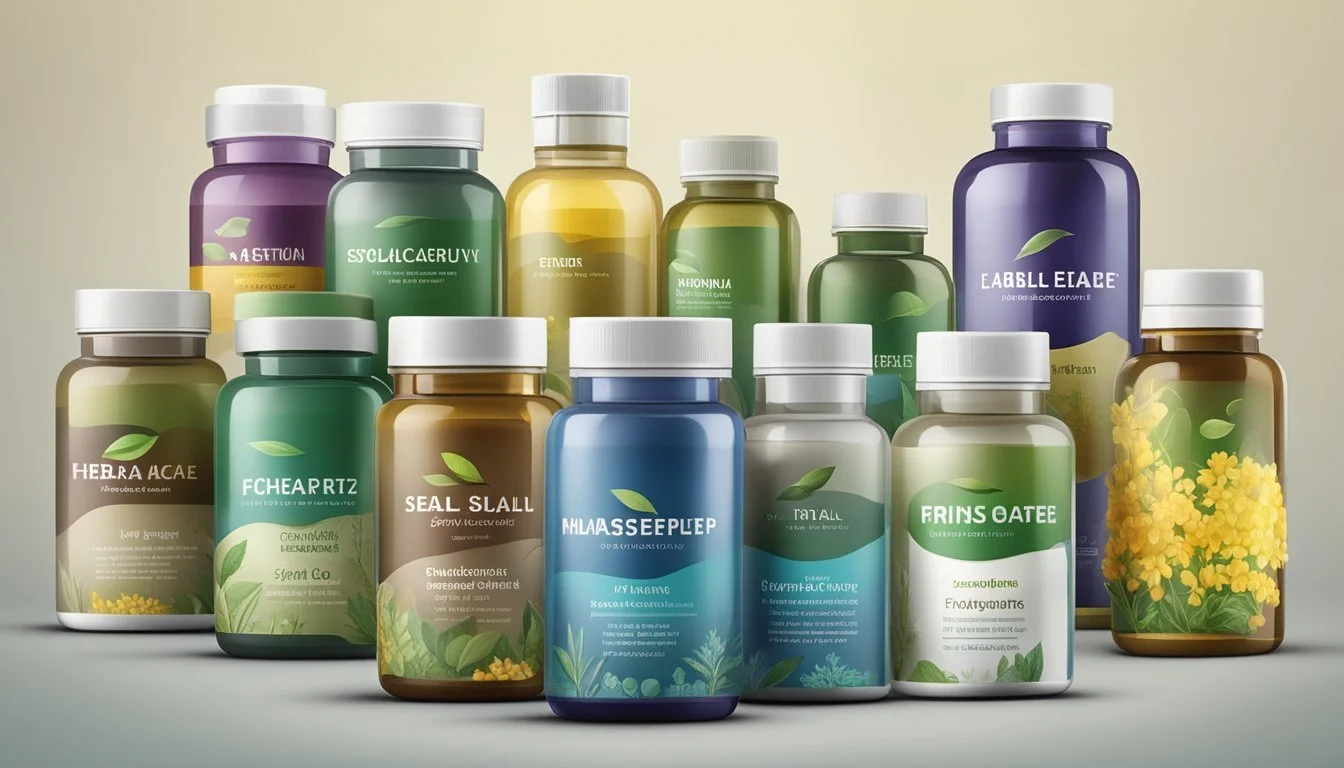Are All Herbal Supplements Safe and Effective?
Uncovering the Truth About Natural Remedies
When considering the safety and effectiveness of herbal supplements, it's crucial to understand that they are not subject to the same rigorous testing as pharmaceutical drugs. Herbal supplements are indeed derived from natural sources, yet the absence of standardized regulation can lead to variations in strength and purity. As such, while some individuals may report positive health benefits from their use, these supplements can also have potential interactions with prescription medications and may not be safe for all individuals.
Evaluating the effectiveness of herbal supplements can be challenging due to the limited scientific data available on many of these products. While certain herbs have been used traditionally for health purposes and some modern research supports their potential benefits, the overall body of evidence is often less comprehensive than that for conventional medicines. Consumers should approach herbal supplements with careful consideration of their specific health needs and consult healthcare professionals before starting any new supplement regimen.
Safety is especially pertinent when it comes to herbal supplements. The fact that they are natural does not guarantee they are safe for everyone. The human body's response to herbal supplements can be influenced by a variety of factors, including age, health status, and individual biochemistry. There's also the risk of contaminants in supplements that are not meticulously monitored or verified by third-party testing. Thus, it’s paramount for consumers to be discerning and seek high-quality products with a clear indication of their ingredients and dosages.
Understanding Herbal Supplements
Herbal supplements have piqued the interest of health-conscious individuals seeking natural remedies. They are botanical products with a rich history in traditional medicine systems and are now available in a variety of forms, each carrying potential health benefits.
Definition and History
Herbal supplements, also regarded as herbal medicines or botanical products, consist of plant-derived ingredients intended to improve health. Historically, civilizations such as ancient China have been utilizing these natural compounds for thousands of years. The concept rests on the premise that natural ingredients yield health benefits, although not all natural compounds are safe or effective for every individual.
Types of Herbal Supplements
These supplements come in numerous forms, catering to different needs and preferences:
Capsules and Tablets: Convenient and with a controlled dosage.
Teas: Often used for digestive and calming effects.
Powders: Can be mixed with liquids and are easily absorbed.
Extracts and Tinctures: Concentrated forms that ensure a more potent dose.
Every form is designed with the intent to harness the benefits of plants in a convenient way.
Common Herbal Supplements
A variety of herbal supplements are popular for their purported health benefits:
Echinacea: Believed to boost the immune system.
Ginkgo Biloba: Touted for enhancing memory and cognitive function.
Ginseng: Associated with improved energy levels and stress relief.
Black Cohosh: Often used for menopause symptoms.
Garlic: Known for its potential cardiovascular benefits.
Goldenseal: Sometimes used for its antimicrobial properties.
It's critical for consumers to be aware that despite their natural origin, herbal supplements can interact with medications and may not be appropriate for everyone. Consulting with a healthcare provider or clinic knowledgeable in herbal medicines is advised for advice tailored to individual health needs.
Regulatory Overview
The regulatory landscape for herbal supplements involves a complex interplay between the safety and efficacy of products and the standards set by regulatory agencies. The focus remains on safeguarding public health while navigating the nuances of traditional and conventional medicine.
FDA Regulations
In the United States, the Food and Drug Administration (FDA) regulates dietary supplements under a different set of regulations than those covering conventional food and drug products. While the manufacturers of herbal supplements are responsible for ensuring safety and accurate labeling of their products, the FDA is not authorized to review dietary supplements for effectiveness before they are marketed.
Medications and Dietary Supplements: Unlike medications, supplements do not require FDA approval before being marketed.
Testing and Safety: It is the company's responsibility to ensure that its products are safe and that any claims made about the product are truthful and not misleading.
Labeling Requirements: The FDA requires proper labeling of supplements, which includes a list of all active and inactive ingredients.
Herbal supplements are expected to have standardized ingredient concentrations, but the degree of standardization can vary widely. The FDA can take action against any supplement found to cause harm or found misbranded after it reaches the market.
Global Standards
The regulatory framework for herbal supplements varies globally, with some countries having more stringent testing and standardization protocols.
China: In China, herbal medicine is often used in conjunction with conventional medicine and is tightly regulated by the China Food and Drug Administration (CFDA).
Standardized Processes: Countries with more stringent regulatory environments tend to enforce standardized testing of herbal supplements to ascertain their safety and efficacy.
In many parts of the world, herbal supplements are regulated as dietary supplements rather than as medications, which can lead to variations in the quality and concentration of these products. Different international bodies and countries strive to harmonize regulations, but global standards are still a work in progress.
Health Benefits and Claims
Herbal supplements are diverse in form, ranging from teas and capsules to powders and tinctures, and they are associated with an equally diverse array of health claims. These claims often relate to the supplements' therapeutic uses and the evidence supporting them, garnered from research and clinical trials.
Therapeutic Uses
Herbal supplements have been historically used for a range of health conditions. For example, Ginkgo biloba is taken for improving memory and potentially alleviating symptoms of dementia. St. John's wort is another herb commonly used for managing depression. Some herbs are valued for their antioxidants, which can aid in neutralizing harmful free radicals in the body. For more acute ailments such as the common cold or flu, echinacea is a popular choice for its supposed immune-boosting properties. Beyond these, herbs like turmeric are taken to help with inflammation, and others, such as garlic, have been connected to heart health benefits and may contribute to managing heart disease and diabetes.
Research and Clinical Trials
The effectiveness and safety of herbal supplements often stem from the findings of scientific evidence and studies. Clinical trials are crucial in validating the therapeutic uses of these supplements. However, evidence can vary greatly depending on the herb and condition in question. For instance, certain studies may support the effectiveness of herbs in managing symptoms or improving health, but this does not always equate to conclusive proof. The role of supplements in managing serious conditions like cancer has garnered interest, but the benefits need to be weighed against the risks with substantial clinical evidence. Furthermore, it is important to note that interactions with conventional medicines can occur, as seen with St. John's wort reducing the effectiveness of drugs like antidepressants and birth control. The healing properties of herbs and their real impact on health conditions continue to be scrutinized in ongoing research.
Risks and Safety Concerns
While herbal supplements offer potential health benefits, they also pose various risks and safety concerns. Consumers should be aware of possible side effects, drug interactions, and specific considerations for different populations.
Potential Side Effects
Herbal supplements can cause side effects, just like conventional medications. These can range from mild to severe and may include nausea, headache, dizziness, and upset stomach. Certain herbs have been associated with more serious outcomes, such as liver damage. For instance, kava kava, although used for its sedative effects, has been linked to severe liver toxicity.
Drug Interactions and Contraindications
Herbal supplements can interact with prescription medications, leading to diminished efficacy or increased side effects of either the supplement or the medication. Warfarin, a blood thinner, can have its effects altered when taken with herbs like feverfew or hawthorn, which also impact blood clotting. Healthcare providers should be consulted before combining herbal supplements with medications.
Special Populations
Some populations need to take extra caution with herbal supplements. Pregnant individuals, for example, should avoid certain herbs that can affect fetal development. The age of a person can also influence the safety of herbal supplements, with the elderly and children being more susceptible to adverse effects. Consulting a healthcare provider is crucial for these groups before initiating any herbal supplement regimen.
Best Practices for Users
When using herbal supplements, it is vital to prioritize safety and efficacy. Consumers should seek quality products, adhere to recommended dosages, and consult healthcare professionals to maximize benefits and minimize risks.
Selecting Quality Supplements
Consumers are advised to choose herbal supplements that have been tested and verified for quality. They should look for products that provide:
Clear labeling: The label should list all the ingredients, including the part of the plant used. It must also state the standardized dose and offer instructions for use.
Third-party testing: Supplements that have been evaluated by organizations like the US Pharmacopeia (USP), ConsumerLab, or NSF International are more likely to meet certain quality standards.
Reputable sources: Purchase supplements from established and respected companies that have a good track record for safety.
Recommended Dosage and Usage
The correct dose of an herbal supplement is crucial for its effectiveness and can reduce the risk of adverse effects. Users must:
Follow manufacturer’s guidelines: Take the supplement exactly as the product label suggests.
Start with a lower dose: To observe how the body reacts, one might begin with a smaller dose before gradually increasing it, as long as it is within the recommended limits.
Mind the duration: Some supplements are meant for short-term use. Research or ask a healthcare provider about how long you can safely use the supplement.
Consulting Healthcare Professionals
Before starting any herbal supplement, one should consult with a healthcare provider, particularly if they:
Take other medications: Herbal supplements can interact with prescription and over-the-counter medications, potentially causing harm.
Have underlying health conditions: Conditions including heart disease, high blood pressure, or diabetes may be affected by certain supplements.
Are expecting or nursing: Some supplements can be harmful to pregnant or breastfeeding mothers, and their babies.
Seek personalized advice: Pharmacists and clinicians can provide tailored advice considering one’s health history and current medications.
Engaging with a healthcare provider ensures informed decisions, leading to a safer experience with herbal supplements.
Consumer Awareness and Education
In the context of herbal supplements, consumer education is crucial for discerning the safety and effectiveness of these products. Awareness of misleading information and understanding the role of supplements in wellness are fundamental for informed decision-making.
Identifying Misleading Information
Misleading claims about herbal supplements can have serious consequences for health. Consumers should look for:
Evidence-based information: Seek scientific research supporting supplement claims.
Regulatory approval: Unlike medications, herbal supplements are not strictly regulated by the FDA for safety or effectiveness.
Check sources: Use reputable sources like healthcare providers or academic institutions to validate claims about health benefits.
Remember, natural does not always mean safe, and contaminants or interactions with medications can pose risks.
The Role of Supplements in Overall Wellness
Herbal supplements may offer benefits for overall wellness, such as providing additional nutrients or energy. However, their role should be seen as complementary, not a substitute for a balanced diet and healthy lifestyle. Factors to consider include:
Health conditions: Some supplements may benefit certain conditions, but evidence varies.
Interactions: Some herbal supplements can interfere with medications. Consultation with a healthcare professional is advised.
Effectiveness: The effectiveness of supplements varies, and what works for one, may not work for another.
Safety: Awareness of the potential risks and side effects is important for the safe use of any supplement.
Regarded as a component of a holistic approach to health and wellness, education on the proper use and potential benefits of herbal supplements is key.




